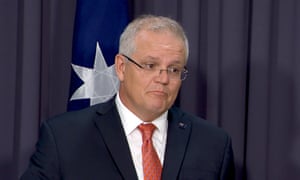The bushfire crisis has not so much unified Australia against the
Morrison government as polarised it along partisan lines, Essential
figures suggest
The most surprising thing about the first Essential Report for 2020 is not that Scott Morrison has taken a personal hit, it’s that it isn’t an absolute walloping.
For those who have been following the prime minister’s torpid response to the ongoing bushfire crisis from the cheap seats, it’s been obvious the PM was cruising for a polling bruising,
He refused to listen to the experts when he should have been preparing, he skived off to Hawaii when he should have been leading, and then re-emerged with forced condolences and forced handshakes as the nation burned.
For those directly impacted by fire it’s been an abject dereliction. Morrison’s attempts to regain control by deploying the armed forces and pledging billions in support and reconstruction have been as unconvincing as his line that no one could have seen this crisis coming (apart, of course, for the fire chiefs).
On social media “Sco-Mo” has morphed into “Scotty from Marketing”, a global figure of derision as the fires became an international media moment. For progressives blessedly one-step removed from the frontline, it’s been like House of Cards and the Big Bash rolled into one: not a matter of if but when it all falls apart for the “faux-gon” who stole the 2019 election.
As the results from this week’s Essential Report suggest, there is no
denying the PM’s personal standing has taken a serious dip over the
past month. On personal approval, one in seven people have changed their
minds from December, with the PM’s net approval rating shifting from +2
(45 approve/43 disapprove) to -12 (40 approve/52 disapprove). On
Preferred PM, too, there has also been a significant shift, with
opposition leader Anthony Albanese now ahead for the first time, 39-36.For those who have been following the prime minister’s torpid response to the ongoing bushfire crisis from the cheap seats, it’s been obvious the PM was cruising for a polling bruising,
He refused to listen to the experts when he should have been preparing, he skived off to Hawaii when he should have been leading, and then re-emerged with forced condolences and forced handshakes as the nation burned.
For those directly impacted by fire it’s been an abject dereliction. Morrison’s attempts to regain control by deploying the armed forces and pledging billions in support and reconstruction have been as unconvincing as his line that no one could have seen this crisis coming (apart, of course, for the fire chiefs).
On social media “Sco-Mo” has morphed into “Scotty from Marketing”, a global figure of derision as the fires became an international media moment. For progressives blessedly one-step removed from the frontline, it’s been like House of Cards and the Big Bash rolled into one: not a matter of if but when it all falls apart for the “faux-gon” who stole the 2019 election.
On personal attributes, there has been a significant deterioration in the PM’s standing against all the key indicators: “a capable leader” down nine points to 45%, “hard-working” down 10 points to 53, “visionary” down 12 points to 30% and, most tellingly, “good in a crisis” down 19 points to just 35%.
This final indicator is particularly damning: the capacity to step up in times of crisis were defining for successful leaders, like Bob Hawke and John Howard, who found a way to fulfil the public’s need for direction when the stakes were highest. Morrison has shown none of this and so has emerged a weaker leader.
Yet for all this grief, the most striking thing about these results is that the negative response from the Australian public has not been stronger, that despite the abject failures over summer there is still a significant cohort backing in leader.
To understand this, we need to dig a layer down in the numbers and look at political allegiance. While Essential is not publishing a two-party preferred figure for now, we are continuing to ask people who they would vote for if an election were being held and this speaks to an increasingly polarised electorate.
This is reinforced when we look at questions around the specific responses to the bushfires by Morrison and the two key state premiers.
Based on these figures, the bushfire crisis has not so much unified the nation against the Morrison government as polarised it along partisan lines.
This is where the brazen efforts to deflect responsibility for the fires to hazard reduction and Greens and arsonists appear effective in shoring up the Coalition base. In a world without an agreed place to mediate truth, it gives people something to hold on to.
There is something eerily Trump-ian about this phenomenon: when the leader is objectively at his weakest, his supporters lock in hard, grabbing on to whatever they need to maintain their worldview.
These findings should also serve as a caution for those who see the crisis as the moment to dramatically up the ask on Australia’s climate policies. Yes, the PM is weakened, but his base needs more to shift.
To assume the climate debate is now over because we have spent the summer living through the consequences of settled science is to fall into the same mistakes that have thwarted progress for the past decade.
Depressingly, the season of fire is not the end of the climate debate, just the beginning of its next chapter, where real progress will be possible only if it can convert the bushfire crises into a climate problem that penalises Morrison where it hurts the most: in his base.
- Peter Lewis is an executive director of Essential, a progressive strategic communications and research company

No comments:
Post a Comment